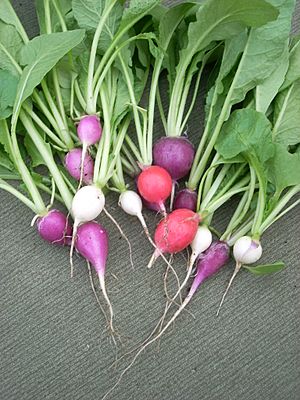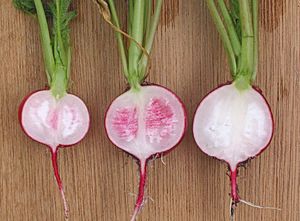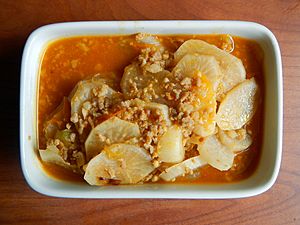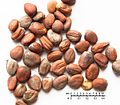Radish facts for kids
Quick facts for kids Radish |
|
|---|---|
 |
|
| Radishes | |
| Scientific classification | |
| Kingdom: | |
| (unranked): | |
| (unranked): | |
| (unranked): | |
| Order: | |
| Family: | |
| Genus: |
Raphanus
|
| Species: | |
| Subspecies: |
R. raphanistrum subsp. sativus
|
| Binomial name | |
| Raphanus raphanistrum subsp. sativus (L.) Domin
|
|
| Synonyms | |
|
Raphanus sativus |
|
The radish is a crunchy root vegetable. It belongs to the same plant family as cabbage and broccoli. People have been growing and eating radishes in Europe since before the Roman Empire.
Radishes are eaten all over the world. Most people enjoy them raw in salads because they are crisp and have a bit of a spicy "bite." There are many types of radishes. They come in different sizes, flavors, and colors. Some are small and round, while others are long and thin. Their sharp taste comes from special chemicals inside the plant.
Radishes grow quickly. Smaller types are ready to eat in about a month. Larger types, like the daikon radish, take a few months. Because they are easy to grow, radishes are a great choice for new gardeners. Sometimes, radishes are also grown to help the soil or for their seeds, which can be used to make oil.
History of Radishes
Scientists believe radishes first came from Southeast Asia. This is where truly wild radishes have been found. Later, different kinds of radishes grew in places like India and China.
We know radishes were around in ancient times. People in ancient Greece and Rome wrote about them around 2,000 years ago. They described radishes that were small, large, round, long, mild, and spicy. Radishes were also one of the first European crops brought to the Americas.
In 1544, a German botanist wrote about huge radishes. He said some weighed about 100 pounds (45 kg) and were about 3 feet (90 cm) long! Today, only the Japanese Sakurajima radish grows that big. The large, mild, white radishes we often see, like daikon, were first grown in China.
What Radishes Look Like
Radishes are plants grown for their swollen roots. These roots can be round, pointy, or long like a cylinder. The skin of a radish can be white, pink, red, purple, yellow, green, or even black! But the inside part, the flesh, is usually white. The red and purple colors come from natural pigments in the plant.
Smaller radishes have a few leaves that are about 5 inches (13 cm) long. Their roots are usually about 1 inch (2.5 cm) wide. They are often eaten raw in salads. Longer radishes, like the daikon, can grow up to 2 feet (60 cm) long. Their leaves can also grow quite tall.
When radishes are picked at the right time, their flesh is crisp and sweet. If they stay in the ground too long, they can become bitter and tough. The leaves of the radish plant grow in a circle, like a rosette. They have a special shape, with one large lobe and smaller ones on the sides. Radish plants also grow white flowers. The plant produces small pods that can be eaten when they are young.
Cooking with Radishes
The part of the radish we eat most often is the root. However, the whole plant is edible! The green tops can be cooked like other leafy vegetables. Even the seeds can be sprouted and eaten raw, similar to mung bean sprouts.
Radish roots are usually eaten raw. They have a crisp texture and a strong, peppery flavor. This flavor comes from natural chemicals that mix together when you chew the radish. These same chemicals are found in mustard and horseradish.
Radishes are very popular in salads. They are also used in many European dishes. Sometimes, radish leaves are added to recipes like potato soup or cooked as a side dish. In Mexican cooking, sliced radishes are often used as a garnish for dishes like tostadas and enchiladas. In India, the radish seed pods are called "moongra" or "mogri" and are used in many meals.
Images for kids
-
Daikon (or bai luobo)—a large East Asian white radish—for sale in India
See also
 In Spanish: Rábano para niños
In Spanish: Rábano para niños
 | Jessica Watkins |
 | Robert Henry Lawrence Jr. |
 | Mae Jemison |
 | Sian Proctor |
 | Guion Bluford |




















